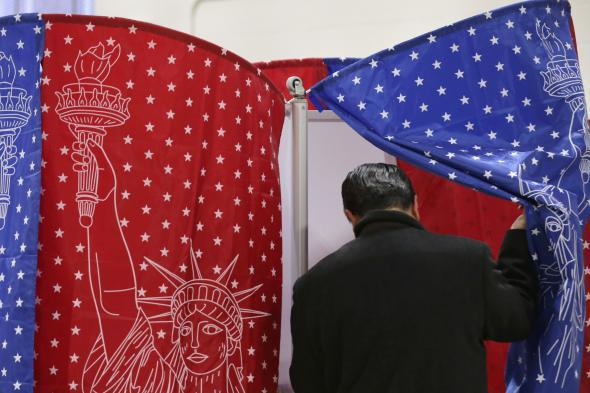Well, this is a surprise. A Republican who would be tasked with voting for Donald Trump in the U.S. Electoral College if the candidate wins the state of Georgia in the general election says he might not be able to go through with it. Speaking to the Atlanta Journal-Constitution on Wednesday, Baoky Vu said that he has already decided he won’t pull the lever himself for Trump in November but added that he would also consider casting his Electoral College vote for someone else later in the year if it came down to it. “I have the right to vote for a write-in candidate in the electoral college,” Vu told his home-state paper.
To which, you are no doubt thinking: Wait, can he really do that? The short answer is, yes, he really can.
Here’s a somewhat simplified version of how Americans elect our presidents: In November, we go to the polls to cast ballots for our preferred candidates. Our votes, however, aren’t technically for the candidates themselves, but instead used to select a predetermined group of electors put forward by each party in our respective state. If, for example, a majority of Georgia voters select Trump in November, the list of 16 state electors chosen ahead of time by state Republicans are the ones who take part in the Electoral College come December. If a majority of Georgia voters select Clinton, the Democrats’ preselected 16 electors get the job. That’s why we say a candidate who wins the popular vote in a state wins its corresponding number of electoral votes. Win enough states to earn a majority of the 538 electoral votes at stake, and you win the presidency.
However: There is nothing in the U.S. Constitution or federal law that requires those electors to actually cast their electoral college votes for the candidate who won their state. Instead, there is a patchwork of state laws that don’t come close to covering the entire country. According to the National Conference of State Legislatures, there are local laws on the books in 30 states and the District of Columbia that require the electors to follow the will of the people—though in most cases, even violating those will cost electors little more than a three-figure fine or get them a slap on the wrist. Meanwhile, that leaves 20 states, including Georgia, with no legal control over their electors. Enter Baoky Vu.
An unbound elector has a number of good reasons to follow through on his or her word even though the law doesn’t require it. For starters, going rogue risks delegitimizing the election and undermines the entire U.S. electoral process. But for those needing a more personal reason, there’s also the simple matter that electors are almost always party stalwarts in their home states, meaning bucking the system will cost them friends and almost certainly their political careers. (It’s not entirely clear how politically connected Vu is—the Journal-Constitution describes him as a “longtime GOP activist in Georgia,” while Vu himself noted he’s “been active in the Republican Party for many years”—but it stands to reason he’s been something of a loyalist if he was chosen to be on the GOP list of would-be electors.)
According to the National Archives, less than 1 percent of electors in U.S. history haven’t voted as they were supposed to. Still, there have been several in recent history, though none have actually swung an election. In 2004, a Democratic elector from Minnesota cast his presidential vote not for John Kerry but instead for his running mate, John Edwards. (The unknown elector also cast his VP vote for Edwards, suggesting this was either a simple mistake or a bizarre statement about just how much he or she loved John Edwards.) In 2000, a Democratic elector from D.C. abstained from voting all together in a bid to protest the district’s lack of congressional representation. In 1976, a Republican from Washington state voted for Ronald Reagan instead of Gerald Ford, who beat Reagan in the GOP primary that year. And in 1972, a Republican from Virginia voted not for Richard Nixon, but instead for the Libertarian candidate, John Hospers. The list of so-called faithless electors goes on. And Vu, who says Trump “lacks the judgment, temperament and gravitas to lead this nation,” may soon join it.
To be clear, what Vu is doing is dangerous and troubling—even if the system itself is far from perfect and in need of reform, and even if Vu doesn’t end up following through on his threat. While a single faithless elector doesn’t mean the system is “rigged” against Trump as he already claims, the GOP nominee and his diehards will almost certainly see it as evidence that it is. More troubling still is that just like the man he’s protesting, Vu is threatening to violate the very political norms that hold our country together.
